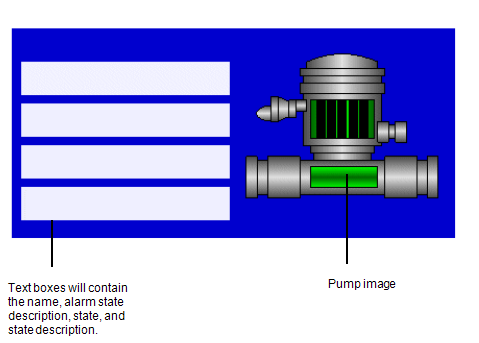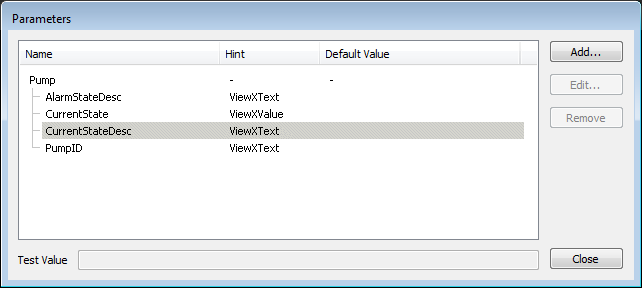Mimic parameters are special properties that you can create for symbol Mimics (generic Mimics that are designed to be embedded on other Mimics). The properties can then be animated in the same way as other properties.
Mimic parameters are normally used with faceplate symbols—Mimics that contain specific information that are designed to be embedded on other Mimics. Although the faceplate symbols are configured to contain specific information, they are not designed to contain information for specific objects in the database—they are usually designed to be generic, so that they can show the same set of information for various objects.
Mimic parameters should not be confused with parameter database items. Mimic parameters are designed for use with symbols, whereas parameter database items are used to store values which can be used as the source value for a variety of features, including Mimics and Logic programs.
Example:
The following faceplate symbol is created to act as a generic display for Pumps. It is to contain the name of a pump, its state, alarm state description, and state description.

The following parameters are created for the pump faceplate symbol:

The Pump parameter is a parent group parameter. It contains the 4 parameters: AlarmStateDesc, CurrentState, CurrentStateDesc, and PumpID. Each of the parameters has a unique property name—none of the parameter names are already in use by embedded Mimics (embedded Mimics have no AlarmStateDesc, CurrentState, CurrentStateDesc, or PumpID properties).
The PumpID is associated with the top text box. It is associated with the Text property of the text box. This means that when the symbol Mimic is embedded on another Mimic, it can have its PumpID property animated by a ViewX expression. The ViewX expression will either define a value or associate the PumpID with the value of an object in the database. The value for the PumpID will be used as the value for the text box's Text animation property.
The CurrentState is associated with the second text box (the text box directly below the top text box). It is associated with the Text property of the text box. This means that when the symbol Mimic is embedded on another Mimic, it can have its CurrentState property animated by a ViewX expression. The ViewX expression will either define a value or associate the CurrentState with the value of an object in the database. The value for the CurrentState will be used as the value for the text box's Text animation property.
The CurrentStateDesc parameter is associated with the Text property of the third text box and the AlarmStateDesc parameter is associated with the Text property of the bottom text box.
The parameters have names that correspond to fields in the database, except the PumpID parameter. There is no field named PumpID. The parameter names affect the Auto Configure option that you can use to animate the symbol when it is embedded on another Mimic.
The faceplate symbol Mimic is saved and is then embedded on another Mimic. The embedded faceplate symbol Mimic has the same animation properties as other embedded Mimics (see Embedded Mimic Animations), and also an extra group of animation properties—the Pump animation properties. The parameters are added to the list of available animation properties.
The Pump animation properties can be configured to have a ViewX expression that defines a specific value or associates the properties with database item properties. For example, the CurrentStateDesc animation property can be associated with the CurrentStateDesc property of a specific point.
The expressions for the animations can be made manually, on an individual basis. However, the Auto Configure feature allows the Pump animation properties to be associated with the corresponding fields for a selected database item.
The Auto Configure feature is made available by selecting the embedded Mimic and then dragging the required database item from the Database Bar onto the embedded Mimic. The Auto Configure Animations option sets the embedded Mimic's parameters to be associated with the corresponding fields for the selected database item. However, the Auto Configure Animations feature can only set up those animations where the parameter name matches a field name of the database item.
So, when the Pump symbol is associated with a database point, the Auto Configure feature will associate the point's values with the parameters as follows:
| Point Property | Associated with Parameter |
|---|---|
|
CurrentState |
CurrentState |
|
AlarmStateDesc |
AlarmStateDesc |
|
CurrentStateDesc |
CurrentStateDesc |
The PumpID parameter is not configured automatically. This is because the database point does not have a property named PumpID. The PumpID parameter has to be associated with an expression manually.
For more information, see the topics that are listed in the gray footer section at the bottom of this topic. Select the relevant entry to display the topic that you require.